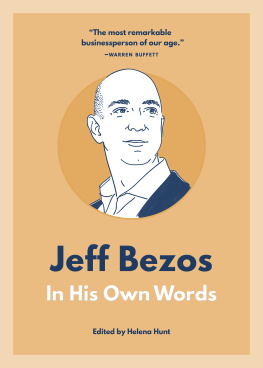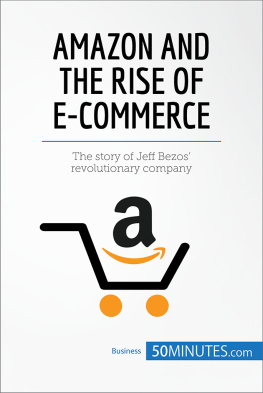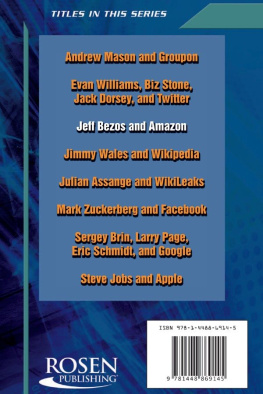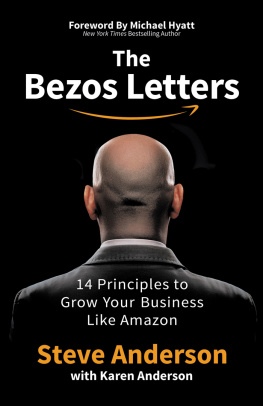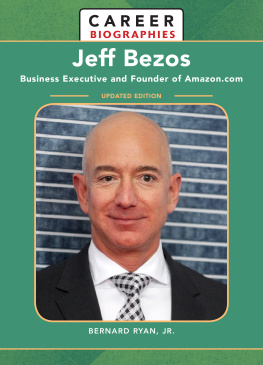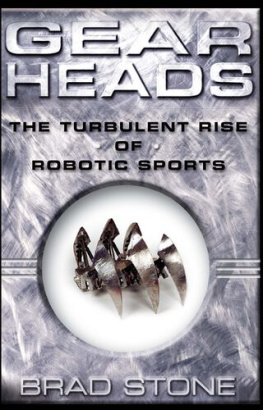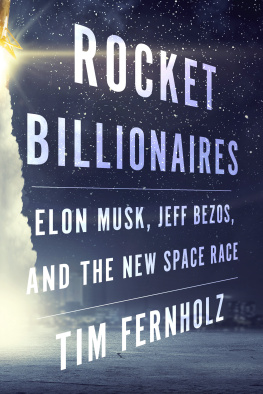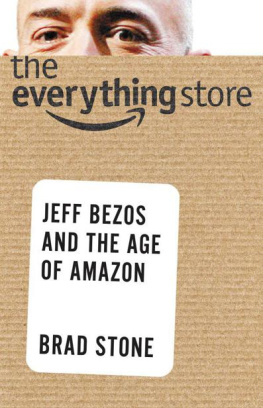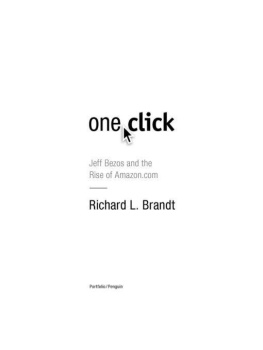
Jeff Bezos
In His Own Words
Jeff Bezos
In His Own Words
EDITED BY
Helena Hunt
CHICAGO
Copyright 2018 by Agate Publishing, Inc.
All rights reserved. No part of this book may be reproduced or transmitted in any form or by any means, electronic or mechanical, including photocopying, recording, or by any information storage and retrieval system, without express written permission from the publisher.
Jeff Bezos: In His Own Words is in no way authorized, prepared, approved, or endorsed by Jeff Bezos and is not affiliated with or endorsed by any of his past or present organizations.
The first edition of this book was published in 2018 under the title First Mover. This edition has been updated and expanded.
Printed in the United States of America
10 9 8 7 6 5 4 3 2 118 19 20 21 22
ISBN-13: 978-1-57284-265-6
ISBN-10: 1-57284-265-2
The Library of Congress has cataloged a previous edition of this book as follows:
Names: Hunt, Helena, editor.
Title: First mover : Jeff Bezos in his own words / edited by Helena Hunt.
Description: First edition. | Chicago : B2 ; Agate Publishing, 2018.
Identifiers: LCCN 2017044823 (print) | LCCN 2018040758 (ebook) | ISBN 9781572848139 (ebook) | ISBN 1572848138 (ebook) | ISBN 9781572842434 (pbk.) | ISBN 1572842431 (pbk.)
Subjects: LCSH: Bezos, Jeffrey--Quotations. | Amazon.com (Firm)--Employees--Quotations. | Book industries and trade--United States. | Businessmen--United States--Quotations. | LCGFT: Quotations.
Classification: LCC Z473.B47 (ebook) | LCC Z473.B47 F57 2018 (print) | DDC 381/.45002092--dc23
LC record available at https://lccn.loc.gov/2017044823
B2 Books is an imprint of Agate Publishing. Agate books are available in bulk at discount prices. For more information, go to agatepublishing.com.
The common question that gets asked in business is, why? Thats a good question, but an equally valid question is, why not?
JEFF BEZOS
Contents
Introduction
T HE ONLINE RETAILER AMAZON MAKES ABOUT $178 billion in annual revenue as of this writing. If you arent contributing to Amazons revenue, perhaps you are making a statement against any number of the companys ethically ambiguous characteristics: its increasingly monopolistic dominance of the e-commerce and retail markets, its often adversarial relationships with book publishers, or its reportedly cold-blooded workplace culture. But Amazons more than 100 million Prime members (a figure finally revealed after much speculation in a 2018 shareholders letter) dont seem too worried about these shortcomings. They choose Amazon again and again for its low prices, dedication to customer service, and willingness to expand into new services and product offerings that, in some cases, anticipate customer needs before customers even know they are needs. The word Amazon has become synonymous, not with a river in South America, but with a particular service made possible by the internetand the vision of Jeff Bezos, Amazons founder and CEO, to foresee the possibilities of moving life online.
Bezos would be the first to say that he isnt solely responsible for the success of his $800 billionmarket cap company and its rapidly multiplying subsidiaries. But it is difficult to imagine the success of Amazonand ventures such as the Washington Post and Blue Originwithout the singular vision, tireless motivation, wide-eyed optimism, and uncanny prescience of the man who started it all.
That prescience is key to most of Bezoss success. In 1994, when he was working at quantitative hedge fund D.E. Shaw in Manhattan, Bezos came across a surprising statistic: the recently created internet was growing at a staggering rate of 2,300 percent a year. Bezos knew he had to join (and, hopefully, monetize) this wave of growth before it left him behind, and so he acted quicklyleaving his job, picking up a Chevy Blazer from his parents in Texas, and driving to Seattle, where he planned to sell books via the internet out of his new houses garage. He chose Seattle because it was a large city with a major airport and because it was near a book warehouse in Oregon. He chose to sell books because they were sortable, packable, and shippableand because a vast selection already existed that couldnt be sold by any single physical retail competitor. In every instance, Bezos applied a keen, almost cold, talent for analysis, optimization, and rapid movement that has proven to serve him well.
Now, more than 20 years later, Amazon will sell you almost anything. You can buy tents, tires, Barbie dolls, fresh food, and restaurant meals on the website, as well as on the devices Amazon itself has pioneeredmost significantly, the Kindle, the first dedicated e-reader, and the Echo, an artificially intelligent, voice-activated, multiuse home device. The companys stock price has soared, and Bezos himself is worth billions of dollars.
The success of Amazon didnt always seem so certain, however. In the late 1990s and early 2000s, during the dot-com boom and bust, analysts called Bezoss company Amazon.bomb, Amazon.con, and Amazon.toast. Bezoss business plan was to have razor-thin margins, relentlessly cutting costs to draw customers while at the same time expanding fulfillment capabilities and selection, a strategy that didnt always create profits or appeal to investors. As stock prices fell, Bezos held on to the mission of Amazon: to be Earths most customer-centric company. He took the long view, and despite warnings and analysts predictions, he did what it took to serve his customersand that included staying in business.
Bezos believes that his customer-forward business modelpredict what people need before they realize they need itis really what drives innovation. This philosophy led to Amazon, of course, but also to Amazon Web Services, a data infrastructure that developers and services such as Netflix, Spotify, and the CIA rent from Amazon; Kindle, an e-reader that Bezos claims improves the technology of the book; and even Blue Origin, Bezoss space company, which also has a forward-thinking, customer-obsessed mentality. Someday, Bezos reasons, people will need to go to space; we might as well start building them a service to do that now.
While the customer-centric model may have won over Amazons vast membership, for employees it can create a punishing environment that isnt oriented to their wants or needs. The infamous 2015 New York Times profile Inside Amazon: Wrestling Big Ideas in a Bruising Workplace describes a corporate culture where employees cry at their desks, are encouraged to leave if they face pregnancy or illness, and struggle against cutthroat internal competition. The Everything Store, a nonfiction account of Amazons rise by Brad Stone, quotes Bezos asking employees Are you lazy or just incompetent? and Do I need to go down and get the certificate that says Im CEO of the company to get you to stop challenging me on this? among other choice phrases.
In public, Bezos may not be as openly confrontational, but he does explain that his company thrives on constant invention, and those who cant keep up will be left behindwhether theyre inside or outside Amazon. But in many ways Bezos still seems to be the earnest intellectual whom a 1999 60 Minutes segment dubbed Nerd of the Amazon. He started Blue Origin in part because he was a fan of Star Trek (a Star Trek game on the school computer was what first got him interested in computers, too). His determination to go to space goes at least as far back as his high school valedictory speech, where he described building hotels and amusement parks for space colonists.
Next page
